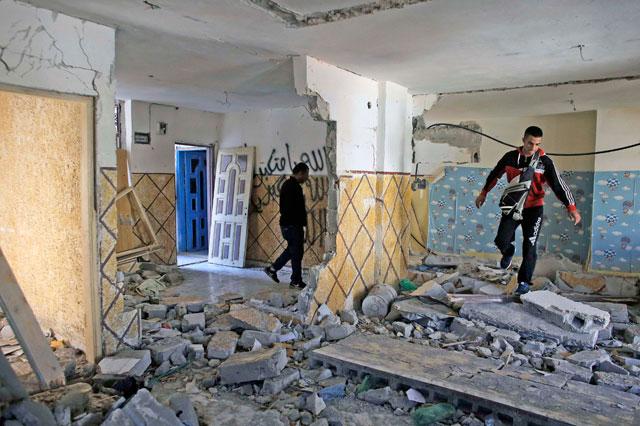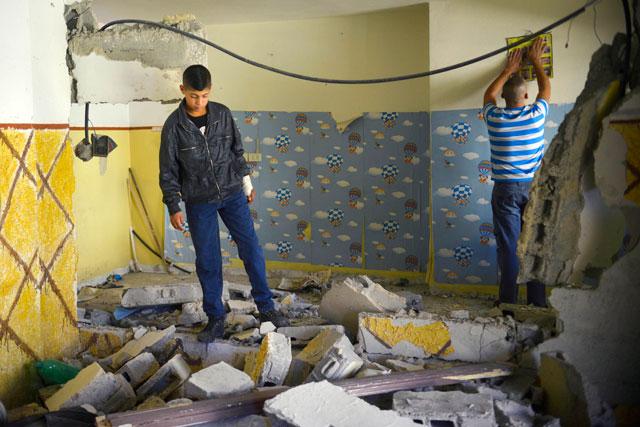You are here
Israel returns to policy of razing East Jerusalem homes
By AFP - Nov 19,2014 - Last updated at Nov 19,2014

OCCUPIED JERUSALEM — Shortly before dawn Wednesday, a powerful explosion ripped out the walls of the home of Abdelrahman Shaludi, a 21-year-old Palestinian from East Jerusalem who rammed his car into Israeli pedestrians.
In demolishing the home of the Palestinian behind last month's attack, which killed a baby and a woman before Israeli forces shot and fatally wounded him, Israel renewed a controversial policy aimed at deterrence but one which is likely to further inflame tensions.
The blast, which rocked the densely populated Silwan neighbourhood on a steep hillside just south of Jerusalem's Old City, marked the restart of a policy of demolishing the family homes of Palestinians responsible for anti-Israeli attacks.
Amer Shaludi, a relative who lives underneath the family's third-floor apartment, said police burst in shortly after midnight, ordering everyone outside.
"Then, at around 4:00am [0200 GMT], there was a huge explosion," he told AFP.
Aware that it was slated for demolition, the family had recently moved out.
As the sun rose, all that remained of the family apartment was a gaping hole in the facade of the building.
Inside, all the walls had been knocked down by explosive charges, and piles of rubble covered the floor.
"Where can we go now? We have nowhere to live, no home," said Nibras, a teenager in a bright pink flowered headscarf and sister of the attacker.
Targeting family members
According to Danny Seidemann, an Israeli lawyer who tracks developments in East Jerusalem, it was the first punitive demolition in the city since April 2009 when Israeli forces razed the home of a Palestinian who went on the rampage a year earlier, killing three Israelis.
But on November 6, following two deadly Palestinian attacks in a fortnight, Netanyahu approved plans to knock down or seal up the homes of anyone attacking Israelis as part of a raft of measures to "restore calm" in Jerusalem.
The aim is to create deterrence: Even if those planning attacks have no concern for their own lives, they might be forced to think twice if they knew it would leave their families homeless.
"The main victims of the demolitions were family members, among them women, the elderly, and children, who bore no responsibility for the acts of their relative and were not suspected of involvement in any offence," Israeli rights group B'Tselem says.
Washington warned last week that demolishing homes could be "counterproductive" and "exacerbate an already tense situation" in Jerusalem.
B'Tselem says that between October 2001 and January 2005, 664 homes were destroyed across the occupied Palestinian territories, leaving 4,182 people homeless before the defence ministry decided to end the policy following research showing it was not an efficient deterrent and could encourage more violence.
Despite the decision, the army destroyed one home in East Jerusalem in 2009 and sealed up two others in the same year, the NGO said.
And earlier this year, troops also razed the homes of three Palestinians accused of involvement in the kidnapping and murder of three Israeli teenagers.
Two homes in the southern West Bank city of Hebron were completely destroyed, while a third was partially razed then sealed off.
48-hours to appeal
Three other families in East Jerusalem have now been formally notified that their homes are slated for demolition.
One is the home of Mohammed Jaabis, 23, from Jabel Mukaber who rammed an earthmover into a bus on August 4, killing an Israeli and wounding five. He was shot dead by police at the scene.
Another is that of Muataz Hijazi, 32, from Abu Tor who on October 29 tried to gun down a far-right Jewish activist, critically wounding him. Hijazi was shot dead the following morning during a police raid.
The third is the home of Ibrahim Akari, 38, from Shuafat refugee camp who on November 5 rammed his car into pedestrians, killing a teenager and a policeman and wounding nine, before also being shot dead at the scene.
Israel has likewise pledged to raze the homes of Uday and Ghassan Abu Jamal from Jabal Mukaber who on Tuesday were shot dead after attacking a synagogue with meat cleavers and a gun, killing four rabbis at prayer and a policeman.
For those whose houses have been condemned, it becomes a waiting game until they receive the date.
After that, they have 48 hours to appeal against the order to the supreme court.
But the Shaludi family did not bother appealing.
"We know this is a political decision, not one based on the law," Abdelkarim Shaludi told AFP, saying the result had been decided in advance.
Related Articles
Israel began a crackdown in East Jerusalem Wednesday, a day after an assault by Palestinians on a synagogue killed five people, razing the home of a resident behind an earlier deadly attack.
Human Rights Watch called on Israel Saturday to stop razing the homes of Palestinians accused of attacking Israelis, saying the practice can constitute a war crime.
Human rights groups have accused Israel of encouraging a shoot-to-kill policy after a wave of incidents in which Israeli forces shot dead Palestinians involved in, or accused of, attacking Israelis.

Opinion
Apr 09, 2025
Apr 08, 2025
- Popular
- Rated
- Commented
Apr 08, 2025
Apr 09, 2025
Newsletter
Get top stories and blog posts emailed to you each day.
















